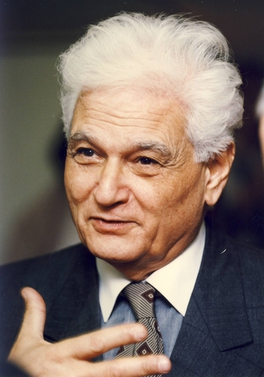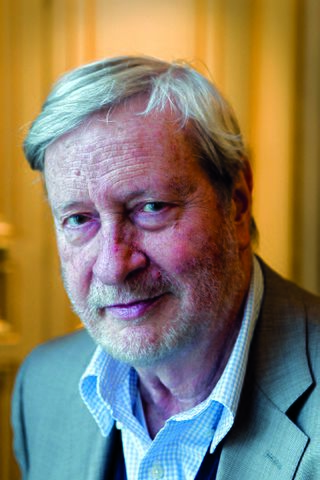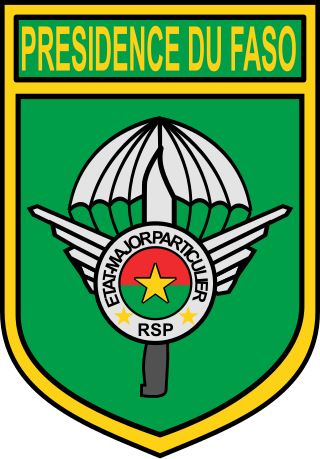Related Research Articles

Burkina Faso is a landlocked country in West Africa. It covers an area of 274,223 km2 (105,878 sq mi), bordered by Mali to the northwest, Niger to the northeast, Benin to the southeast, Togo and Ghana to the south, and Ivory Coast to the southwest. As of 2021, the country had an estimated population of 20,321,378. Previously called Republic of Upper Volta (1958–1984), it was renamed Burkina Faso by President Thomas Sankara. Its citizens are known as Burkinabè, and its capital and largest city is Ouagadougou.
Deconstruction is a loosely-defined set of approaches to understanding the relationship between text and meaning. The concept of deconstruction was introduced by the philosopher Jacques Derrida, who described it as a turn away from Platonism's ideas of "true" forms and essences which are valued above appearances.

Jacques Derrida was an Algerian-born French philosopher. He developed the philosophy of deconstruction, which he utilized in a number of his texts, and which was developed through close readings of the linguistics of Ferdinand de Saussure and Husserlian and Heideggerian phenomenology. He is one of the major figures associated with post-structuralism and postmodern philosophy although he distanced himself from post-structuralism and disowned the word "postmodernity".

The Sahel region or Sahelian acacia savanna is a biogeographical region in Africa. It is the transition zone between the more humid Sudanian savannas to its south and the drier Sahara to the north. The Sahel has a hot semi-arid climate and stretches across the southernmost latitudes of North Africa between the Atlantic Ocean and the Red Sea. Although geographically located in the tropics, the Sahel does not have a tropical climate.
Norbert Zongo, also known under the pen name of Henri Segbo or H.S., was a Burkinabé investigative journalist who managed the newspaper L'Indépendant in Ouagadougou, Burkina Faso. Under Zongo's supervision, L'Indépendant exposed extortion and impunity within the government of Burkina Faso President Blaise Compaoré. He was assassinated after his newspaper began investigating the murder of a driver who had worked for the brother of Compaoré.
Paul de Man, born Paul Adolph Michel Deman, was a Belgian-born literary critic and literary theorist. He was known particularly for his importation of German and French philosophical approaches into Anglo-American literary studies and critical theory. Along with Jacques Derrida, he was part of an influential critical movement that went beyond traditional interpretation of literary texts to reflect on the epistemological difficulties inherent in any textual, literary, or critical activity. This approach aroused considerable opposition, which de Man attributed to "resistance" inherent in the difficult enterprise of literary interpretation itself.

Askia Muhammad I (1443–1538), born Muhammad ibn Abi Bakr al-Turi or Muhammad Ture, was the first ruler of the Askia dynasty of the Songhai Empire, reigning from 1493 to 1528. He is also known as Askia the Great, and his name in modern Songhai is Mamar Kassey. Askia Muhammad strengthened his empire and made it the largest empire in West Africa's history. At its peak under his reign, the Songhai Empire encompassed the Hausa states as far as Kano and much of the territory that had belonged to the Songhai empire in the east. His policies resulted in a rapid expansion of trade with Europe and Asia, the creation of many schools, and the establishment of Islam as an integral part of the empire.
The Mandé peoples are an ethnolinguistic grouping of native African ethnic groups who speak Mande languages. Various Mandé speaking ethnic groups are found particularly in the western regions of West Africa. The Mandé languages are divided into two primary groups: East Mandé and West Mandé.

Hadji Oumarûl Foutiyou Tall, born in Futa Tooro, present day Senegal, was a West African Tijani sufi Toucouleur Islamic scholar and military commander who founded the short-lived Toucouleur Empire, which encompassed much of what is now Senegal, Guinea, Mauritania and Mali.

Kōjin Karatani is a Japanese philosopher and literary critic.

Yambo Ouologuem was a Malian writer. His first novel, Le devoir de violence, won the Prix Renaudot. He later published Lettre à la France nègre (1969), and Les mille et une bibles du sexe (1969) under the pseudonym Utto Rodolph. Le devoir de violence was initially well-received, but critics later charged that Ouologuem had plagiarized passages from Graham Greene and other established authors such as André Schwartz-Bart. Ouologuem turned away from the Western press as a result of the matter, and remained reclusive for the rest of his life.

Gianteresio Vattimo was an Italian philosopher and politician.
African literature is literature from Africa, either oral ("orature") or written in African and Afro-Asiatic languages. Examples of pre-colonial African literature can be traced back to at least the fourth century AD. The best-known is the Kebra Negast, or "Book of Kings."
The Wangara are a subgroup of the Soninke who later became assimilated merchant classes that specialized in both Trans Saharan and Secret Trade of Gold Dust. Their diaspora operated all throughout West Africa Sahel-Sudan. Fostering regionally organized trade networks and Architecture projects. But based in the many Sahelian and Niger-Volta-Sene-Gambia river city-states. Particularly Dia, Timbuktu, Agadez, Kano, Gao, Koumbi Saleh, Guidimaka, Salaga, Kong, Bussa, Bissa, Kankan, Jallon, Djenné as well as Bambouk, Bure, Lobi, and Bono State goldfields and Borgu. They also were practicing Muslims with a clerical social class (Karamogo), Timbuktu Alumni political advisors, Sufi Mystic healers and individual leaders (Marabout). Living by a philosophy of mercantile pacifism called the Suwarian Tradition. Teaching peaceful coexistence with non-Muslims, reserving Jihad for self-defence only and even serving as Soothsayers or a "priesthood" of literate messengers for non-Muslim Chiefdoms/Kingdoms. This gave them a degree of control and immense wealth in lands where they were the minority. Creating contacts with almost all West African religious denominations. A group of Mande traders, loosely associated with the Kingdoms of the Sahel region and other West African Empires. Such as Ghana, Mali, Songhai, Bono State, Kong, Borgu, Dendi, Macina, Hausa Kingdoms & the Pashalik of Timbuktu. Wangara also describes any land south of Timbuktu and Agadez. The Bilad-Al-Sudan or Bilad-Al-Tibr, "Land of Black" or "Gold."

Burkinabé literature grew out of oral tradition, which remains important. In 1934, during French occupation, Dim-Dolobsom Ouedraogo published his Maximes, pensées et devinettes mossi, a record of the oral history of the Mossi people. The oral tradition continued to have an influence on Burkinabé writers in the post-independence Burkina Faso of the 1960s, such as Nazi Boni and Roger Nikiema. The 1960s saw a growth in the number of playwrights being published. Since the 1970s, literature has developed in Burkina Faso with many more writers being published.
Ranjana Khanna is a literary critic and theorist recognized for her interdisciplinary, feminist and internationalist contributions to the fields of post-colonial studies, feminist theory, literature and political philosophy. She is best known for her work on melancholia and psychoanalysis, but has also published extensively on questions of post-colonial agency, film, Algeria, area studies, autobiography, Marxism, the visual and feminist theory. She received her Ph.D in 1993 from the University of York. She has taught at the University of Washington in Seattle and at the University of Utah, and in 2000 began teaching at Duke University, where she is Professor of English, Literature and Women's Studies. Her theorization of subjectivity and sovereignty, including her recent work on disposability, indignity and asylum, engages with the work of diverse thinkers such as Derrida, Irigaray, Kant, Marx, Heidegger, de Beauvoir, and Spivak. From 2007 until 2015, she was the Margaret Taylor Smith Director of Women's Studies, and in July 2017, she was appointed to be the incoming Director of the John Hope Franklin Humanities Institute, both at Duke University.

The Tarikh al-fattash is a West African chronicle written in Arabic in the second half of the 17th century. It provides an account of the Songhay Empire from the reign of Sonni Ali up to 1599 with a few references to events in the following century. The chronicle also mentions the earlier Mali Empire. It and the Tarikh al-Sudan, another 17th century chronicle giving a history of Songhay, are together known as the Timbuktu Chronicles.

The Regiment of Presidential Security, sometimes known as the Presidential Security Regiment, was the secret service organisation responsible for VIP security to the President of Burkina Faso, a landlocked country in West Africa. It was autonomous from the Army. Until 31 October 2014, the President was Blaise Compaoré, a military officer who came to power in a 1987 coup d'état. The elite unit was well known for its frequent involvement in the politics of Burkina Faso, acting as the iron fist of President Compaoré in his domination of the country. They were said to be widely feared by many people in the country, which in 2012 – two years prior to the end of Compaoré's government – was described by the Democracy Index as an "authoritarian regime".

Harouna Kaboré was born on July 24, 1977 in Assuefry.
References
- ↑ Developing American Studies at Arab Universities: Resources, Research, and Outreach, Edited by Christopher Wise & Mounira Soliman. Cairo, Egypt: Bi-National Fulbright Commission & the American Embassy, Cairo, 2004.
- ↑ Wise, Christopher (1998). "In Search of Yambo Ouologuem". Research in African Literatures. 29 (2): 159–182. ISSN 0034-5210. JSTOR 3820728.
- ↑ Les Frontières racialisées de la littérature française: Contrôle au faciès et stratégies de passage, by Sarah Burnautzki. Paris: Honoré Champion, 2017.
- ↑ "Wise, Christopher, ed. 2001. The Desert Shore: Literatures of the Sahel," by Obed Nkunzimana, Africa Today, Vol. 50, No. 1 (Spring/Summer) 2003: 144-149.
- ↑ “Hommage d’un Américain à Norbert Zongo,” by Liermè Somé, L’Indépendant[Ouagadougou, Burkina Faso] No. 396, 10 avril 2001: 15; “Faire connaître le Burkina aux Américains,” by Sita Tarbagdo, Sidwaya[Ouagadougou, Burkina Faso] N. 4238, 9 avril 2001: 25; . “Un livre dédié à Norbert Zongo,” Aujourd’ hui[Ouagadougou, Burkina Faso] 4 avril 2001: 2; “Lee Nichols Talks to Richard Priebe,” The ALA Bulletin, Vol. 26 (Spring 2000): 39-44; “Norbert Zongo ou le journaliste comme <<intellectuel total>>,” by Pascal Blanchini, in Figures croisée d’intellectuels: Trajectories, modes d’action, productions, (ed) Abel Kouvouama et. al, Paris: Editions Karthala, 2007: 138-158; "One Moment of State Terrorism in Africa," by Tunde Fatunde, The Guardian[Lagos, Nigeria], Monday, September 13, 2004: 67.
- ↑ Review: Mahmud Kati, Ta’rikh al-fattash: The Timbuktu Chronicles 1493- 1599,”by Nubai Kai. Journal of the African Literature Association, Vol. 6, No. 2 (2013).
- ↑ “The Timbuktu Chronicles, 1493-1599, Edited by Christopher Wise,” by Stephen Ney. Chimo, Number 62 (Fall 2011): 20-23;
- ↑ “Christopher Wise, ‘Derrida, Africa, and the Middle East,’” by Shane Moran, Textual Practice, Vol. 24, Issue 2 (2010): 382-388.
- ↑ “Algeria’s Impact on French Philosophy: Between Poststructuralist Theory and Colonial Practice,” by Muriam Haleh Davis, Jadaliyya, June 6, 2011. jadaliyya.com/…/algerias-impact-on-fre…
- ↑ “Derrida, Africa, and the Middle East: Critical Philosophy for Africa,” by Emilia Ilieva, Daily Nation , Sunday, December 18, 2011.
- ↑ “Deconstructing Zionism: Liquidating Heidegger (Vattimo, Butler, Elis, et. al.),” by Zachary Braiterman. Jewish Philosophy Place. March 24, 2014.
- ↑ Review “Deconstructing Zionism: A Critique of Political Metaphysics,” by Nigel Parsons, New Zealand International Review, Vol. 41, Issue 1 (Jan/Feb 2016): 31; Rev of Deconstructing Zionism: A Critical of Metaphysical Politics,” by Netta van Vliet, Critical Inquiry, March 12, 2015; “Review, Deconstructing Zionism: A Critique of Political Metaphysics,” by David Lloyd. Los Angeles Review of Books, August 17, 2014; “Here is Why Deconstructing Zionism Is Important: To Criticize Zionism Means To Ask Justice For Its Victims,” by Michael Marder. Aljazeera. 08 December 2013; “Derrida and the Crisis of French Zionism,” by Andrew Ryder. Jadaliyya(April 23, 2013). http://www.jadaliyya.com/pages/index/11272/derrida-and-the-crisis-of-french-zionism
- ↑ “The Language of Science and the Science of Language: Chomsky’s Cartesianism,” by David Golumbia. Diacritics, Vol. 43, No. 1 (2015): 38-62.
- ↑ See “The Jihad of Iyad Ag Ghali,” Critical Nationalisms, Counterpublics Lecture Series, Green College, University of British Columbia, Vancouver, Canada, January 9, 2019. https://mediasite.audiovisual.ubc.ca/Mediasite/Play/11a7750317034bee973b2649dc2f514c1d
- ↑ “Review of The Yambo Ouologuem Reader,” by Spencer Dew, Raintaxi: Review of Books: Online Edition, Summer 2009. http://www.raintaxi.com/online/2009summer/ouologuem.shtml
- ↑ Buchanan, Ian (2002). "On Perry Anderson's The Origins Of Postmodernity, Clint Burnham's The Jamesonian Unconscious: The Aesthetics Of Marxist Theory, Steven Helmling's The Success And Failure Of Fredric Jameson: Writing, The Sublime, And The Dialectic Of Critique, Sean Homer's Fredric Jameson: Marxism, Hermeneutics, Postmodernism, Adam Roberts's Fredric Jameson and Christopher Wise's The Marxian Hermeneutics Of Fredric Jameson". Historical Materialism. 10 (3): 223–243. doi:10.1163/15692060260289752.
- ↑ Lang, George (2001). "Reviewed Work: Yambo Ouologuem, Postcolonial Writer, Islamic Militant by Christopher Wise". Research in African Literatures. 32 (1): 136–138. JSTOR 3820593.
- ↑ Nkunzimana, Obed (2003). "Reviewed Work: The Desert Shore: Literatures of the Sahel by Christopher Wise". Africa Today. 50 (1): 144–149. doi:10.1353/at.2003.0062. JSTOR 4187564. S2CID 144394775.
- ↑ “Review: Norbert Zongo. The Parachute Drop, Tr. by Christopher Wise,” by Janis L. Pallister, ALA Bulletin(African Literature Association), Volume 31, No. 2 (Winter) 2005/ No. 2 (Spring) 2006: 68-70.
- ↑ Hageman, Andrew (2013). "Book Review: Derrida, Africa, and the Middle East". Christianity & Literature. 63 (1): 153–156. doi:10.1177/014833311306300121.
- ↑ Smith, Node (2009). "Derrida, Africa, and the Middle East". Africa Today. 56 (2): 104–106. doi:10.2979/AFT.2009.56.2.104.
- ↑ Steele, Mara (2014). "Christopher Wise, Chomsky and Deconstruction: The Politics of Unconscious Knowledge, New York: Palgrave Macmillan, 2011". Derrida Today. 7 (1): 106–111. doi:10.3366/drt.2014.0080.
- ↑ Farias, P. F. de Moraes (2013). "Reviewed Work: Taʾrīkh al Fattāsh: The Timbuktu Chronicles 1493–1599 by Christopher Wise, Hala Abu Taleb". Islamic Africa. 4 (2): 249–256. JSTOR islamicafrica.4.2.249.
- ↑ Wise, Christopher Sorcery, Totem, and Jihad in African Philosophy,” by T. L. Lott, Choice: Current Reviews for Academic Libraries, Vol. 55 (2), October 2017: 219.